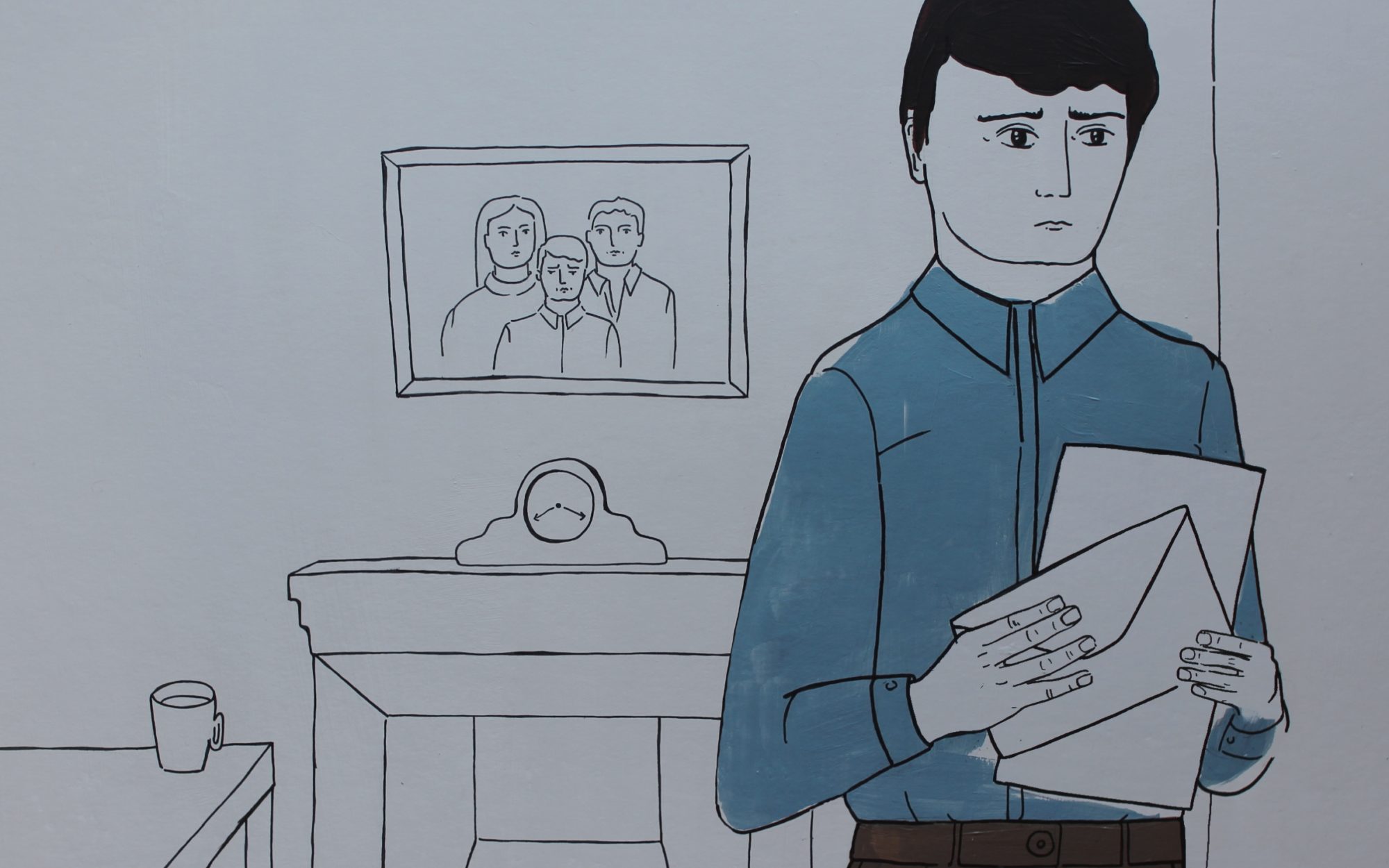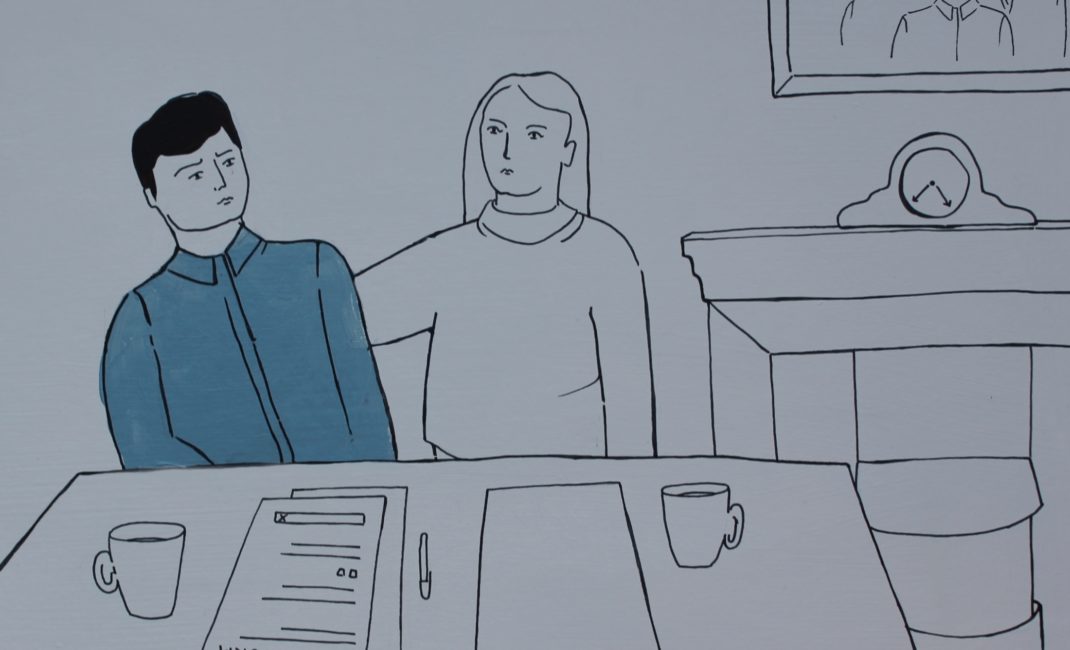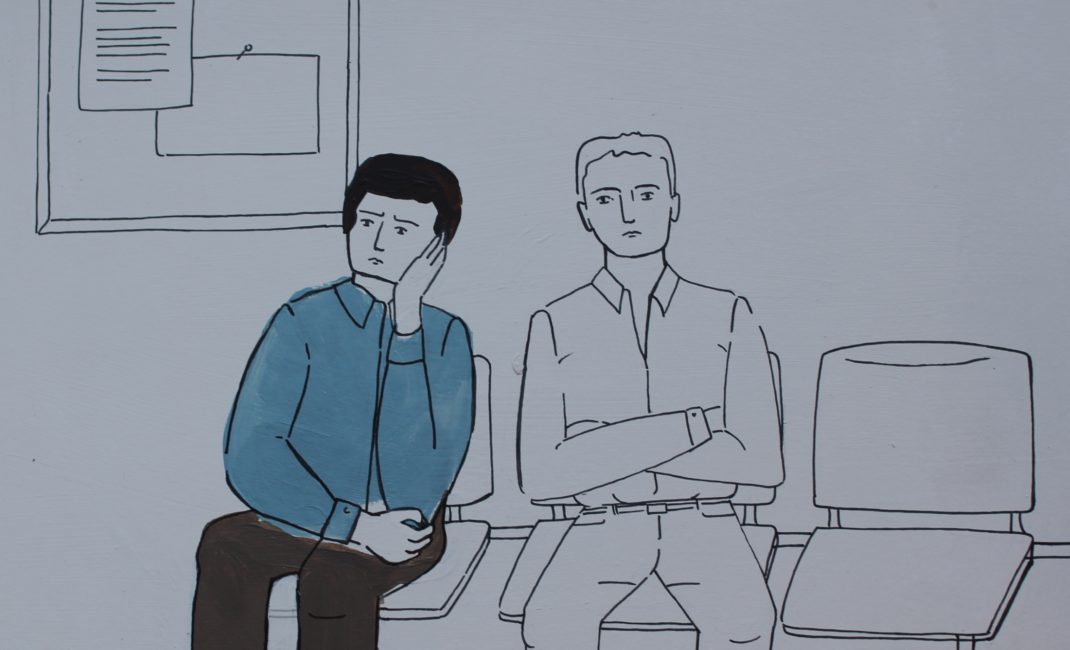As a young man with autism strives for independence, Abigail Minor’s short story describes the impossible challenge of accessing the support he deserves.
“I just can’t do it,” says Chris, throwing his pen down on the questionnaire, slumping back in his chair.
He folds his arms across his chest, the closeness and pressure of the action giving a sense of security.
“What’s the matter?” asks his mother calmly, all too aware of the potential for the situation to spiral.
“It doesn’t make any sense. There’s so many questions. Can’t you just do it?”
“I can’t do it for you, Chris. You’ll never learn that way. We can sit down and go through it together if you like?”
Chris sighs heavily, his muddled brain working overtime to clear the fog. “Okay, I suppose that will work”.
Mandy smiles at her son’s resilience, a mixture of pride and relief at the aversion of a full-blown tantrum.
“Great. I just need to put a wash on and prepare the veg for dinner first.”
“No no no no, that won’t work. It needs to be done now. We need to get it sent off today, otherwise it’ll never be sorted…” the panic rising in Chris’ voice, a volcano preparing for eruption.
With the flick of a switch Chris can go from perfectly calm to agitated. This is the way his autistic mind works: set on track, everything perfectly planned-out, and then it only takes the smallest bump in the road to derail his entire day.
Mandy considers instead how her plans can again be rearranged around her son’s needs.
“Would you at least like a cup of tea before we get started?”
Chris smiles and goes to the fridge to get the milk whilst Mandy puts the kettle on. Cups of tea made, the two sit back down.
Mandy flicks through the hefty questionnaire in front of her. Even to her, a head teacher at a primary school, the 24 pages of text and boxes seem daunting. It’s full of very similarly worded questions, minute enough in their differences to catch out even the most diligent of readers. No wonder Chris found this so difficult.
After several hours and numerous ‘moments’ (the family is in the habit of calling the times when Chris gets stressed out and frazzled ‘moments’ – not all-out tantrums, but not far off either), the form is filled out to the best of their combined abilities.
A form that offers financial support for disabled people ironically seems to require a degree to complete.
Mandy drives Chris to the local Post Office, and waits in the car while he goes inside to buy the stamp and send off the letter – a routine they’ve mastered together since Chris was seven.
With a warming sense of accomplishment, they return home. Three weeks later, Chris receives a letter through the post.
Chris always loves receiving mail. It gives him a sense of importance, knowing that somebody wants to contact him.
Mum! Dad! I got it, I got it!” Chris exclaims, running into the living room clutching the piece of paper.
“Got what, son?” asks Rob.
“The allowance!” he beams back.
“That’s great news. Let me see.” Rob reads the letter thoroughly, never fully trusting Chris’ comprehension skills. But this time, he’s right. Chris will receive an allowance from the government with immediate effect whilst they continue to assess his application.
“Yes, it is! I can go and buy things myself now. Things I need. Like socks. All mine have holes in. If I’m going to be applying for jobs I need to have good socks.”
The couple chuckle. “Yes, I suppose you do Chris,” smiles Mandy.
Chris continues chattering all evening about what he can now buy and do with the allowance. His first source of income. His first step to independence.
*****
With each new form to be filled comes yet more challenges, more frustrations, more moments. One of the requirements for the Employment and Support Allowance (ESA) is a doctor’s note, formally signing off Chris as ‘autistic’, labelling him as different, sub-normal, an outcast.
The family’s word and Chris’ previous diagnosis aren’t enough.
As unnecessary as it feels, Mandy picks up the phone to call the local GP. She can’t face the ordeal that would ensue if she made Chris call the surgery himself, as she knows she ought to. Sometimes, you just have to choose your battles.
Chris can’t understand why he has to wait almost two weeks for the appointment with the doctor. After all, he needs this letter now.
Mandy tries to explain to her son about how other people need to see a doctor too, to little avail. The conversation ends with Chris locking himself in his room for the rest of the day, sulking – a foul mood that hangs over the whole family until the appointment arrives.
The next step in the process is to take the doctor’s note to the jobcentre and submit the application. Mandy cringes every time she has to visit that place. She tends to steer clear of anywhere that needs a security guard on the door before 8pm.
Chris doesn’t belong at the job centre, he belongs in a job. He’d love to work, and wants more than anything to earn a wage and have that sense of accomplishment and independence, if only it were possible for him to do so.
Most people take all this for granted, and it infuriates Mandy. Chris is happily oblivious to all this.
With a spring in his step, Chris walks up to the advisor and hands over his doctor’s note with a level of force that for anyone who didn’t know Chris would be verging on rude. Of course, Chris isn’t being rude, this is just how he is.
The advisor looks up at Chris, searching for an explanation. When none comes from the young man, Mandy steps in on her son’s behalf.
“Do take a seat,” he says passively, concentrating on reading through the note.
Alarms go off in Chris’ head. Why does he want me to take his chair? Chris doesn’t understand euphemisms or sarcasm; everything is black and white in Chris’ world.
“We can sit down, love,” Mandy whispers to her son, knowing the confusion such a statement would cause him. She chuckles for the man’s sake, trying hard to keep things light.
Her mind wanders off to how Chris will ever cope in a job interview without her there to translate for him. The familiar whirring of worry begins to build in her stomach. Stop it.
“Unfortunately, I’m not sure that this is going to be accepted,” informs the advisor.
“What? Why not?” asks Mandy.
“The surgery’s address isn’t stamped on the letter. I can submit it without, but they’d probably just reject it and send it back anyway.”
“You must be joking. Can I not write the address in?” Mandy reasons.
The advisor just shakes his head sympathetically.
Mandy sighs and puts her arm protectively across Chris’ back, steering him towards the exit. “Thank you, I’ll sort it”.
Back in the car, Chris looks at his mother confused. “Did I do something wrong?” he asks.
“No, no it’s not your fault. The surgery messed up, not you.”
“Ok I see,” Chris’ only reply as he hangs his head.
Mandy thinks this is strange. She was expecting a full meltdown from her son, the usual reaction to when things don’t go his way. But instead, her son is silent.
After a pause, Chris turns to his mother. “This is hard enough as it is, why can’t people just do their jobs properly?”
A lump rises in Mandy’s throat. She promised herself years ago that Chris would not see her cry, but the disappointment her son is clearly feeling is close to crumbling her steely wall.
After a deep breath, she places her hand on his knee and squeezes, uncertain as to which one of them she is reassuring the most.
The only response she can pull together is a simple “I know.”
*****
Next, Chris has to attend a face-to-face interview assessment in the centre of York.
Chris is so excited by the prospect of a day trip on the train with his dad. He has been babbling away at Rob all morning, a million miles away from the usual anxiety he feels when meeting new people.
Rob loves spending time with his son too, but is all too aware of the stresses the day could bring.
Read more: Alternative voices on austerity
He isn’t wrong. It’s 10.58 and the 10.50 train still hasn’t arrived. The anxiety rises within Chris as his meticulously planned-out day slips from his tight grasp.
This is always the danger with family outings. Chris needs to know what he’s doing; a carefully timed schedule for the day enables him to relax and enjoy himself. Chris hates deviations from the programme, and struggles to cope with change, so the fact that the train is late fills Chris with unease.
Rob does his best to calm his son, chatting to him about random observations to keep his simmering mind occupied until the train eventually pulls up to the platform.
Tickets in hand, they climb aboard. Chris takes a moment to familiarise himself with his new surroundings before heading off in the direction of his reserved seat, another way to help himself to cope with the journey.
“45, 46, 47…” Chris counts each seat aloud as he walks. He stops abruptly when he gets to seat number 53.
“Erm, excuse me, you’re in my seat,” he informs the man sitting there. Chris’s tone seems abrupt, but there’s not a hint of passive aggressiveness in his words. Chris does know what passive aggressive is.
Tattooed with a buzz cut and arms the size of Chris’ thighs, the man looks Chris up and down, and then around at the half-empty train. “You’ve got to be kidding, mate,” he chuckles deeply.
“Nope,” Chris replies bluntly, showing the man his ticket. “Seat 53 is my seat.”
“Look, pal…” Rob has caught up with his son by this point, and steps in to relieve the situation, ushering his son away from the angry man.
Chris goes to protest, but Rob gently pushes him further down the train, apologising first to the man, and then to the other passengers disrupted by the scene.
He knows he shouldn’t apologise for his son’s behaviour, that it wasn’t Chris’ fault, but sometimes it’s just easier to apologise than try to explain. They wouldn’t understand. Not properly.
*****
Just over an hour later, the pair are called into the interview room. A cosy looking room, a lot less formal than Rob was expecting.
Five blue chairs form an L-shape in the corner, with a coffee table in-between. A plant sits on the table, a box of tissues to its left.
Oh god, I hope they aren’t necessary.
Behind a desk, the assessor sits in a big black chair. She looks up from her computer as they walk in, giving them a big welcoming smile before rising from her chair to greet them.
“I’m Anna,” the lady explains, “You must be Robert.”
She shakes his hand, before turning and extending her hand to Chris.
“And you must be Chris?” she says softly.
Chris doesn’t respond. He looks at his father, who gives him a reassuring nod.
Looking back to Anna, whose arm is patiently still outstretched, Chris shakes her hand and smiles a shy “yes”.
A warm feeling washes over Rob like a wave. She gets it. He likes her, and, for the first time since receiving the letter to arrange the assessment, he feels optimistic.
“Please, do sit down,” she says, suggesting to the chairs.
The interview goes well, and, despite some initial apprehension, Chris has warmed to Anna and answered all her questions as best he could.
Feeling so proud of his son, Rob decides to extend the trip. “How about we go find some cake?” he asks Chris, whose face lights up at the suggestion.
Rob laughs, almost jealous of how much the small things in life mean to his son.
He contemplates Betty’s Tea Rooms, world-famous for its afternoon teas and cake selection. As much as Rob would love to take Chris there, he just can’t risk it, and instead settles for the relative safety of Costa.
Chris doesn’t care, but Rob does.
*****
A few weeks later, the letter from the Department of Work and Pensions drops like a bomb on the doormat.
Chris’ excitement at receiving post is soon destroyed by the words upon the paper. His whole demeanour changes, and Mandy knows it’s bad news before Chris can muster together the words to tell her.
“No!” was all he could manage. Repeating it over and over, his muddled brain unable to fully process what he had read:
We are sorry to inform you that you have not passed the assessment for the Employment and Support allowance, and as such your funds will be terminated with effect from the date below.”
Mandy tries to console her son, but he backs away from her hug as usual.
“I’m so sorry Chris, we can sort something though don’t worry.” She says the words, but doesn’t necessarily believe them herself. She knows how devastating this is for Chris, and, honestly, she doesn’t really know how it can be sorted.
“It’s not fair!” Chris exclaims, “I’m so fed up of all this.”
“I know, Chris. But there are things we can do.”
“Why does it have to be so hard?”
Mandy’s stomach drops. She bites down hard on her lip to hold back the tears threatening to destroy the dam.
*****
“It isn’t right,” Rob complains as he paces the bedroom that evening.
How can you be ‘not autistic enough’?”
“They say he’s too highly functioning for the allowance, that he’s able to work and support himself,” Mandy replies, much calmer than her husband having had the entire afternoon to process the news.
“But that’s bullshit!” he barks, before getting control of himself once more.
“He’ll never be able to hold down a full-time job, and no part-time job will pay enough for him to be financially independent! This allowance gave him a chance at that.”
Although speaking in hushed tones so as not to wake Chris, the anger is evident in his voice.
“I know,” whispers Mandy, sitting on the edge of the bed.
“And his little face this evening! I’ve never seen him so deflated. It breaks my heart.”
“I know.”
“We’ve worked bloody hard as a family for the last 23 years to get him to where he is now. We’ve had to fight and battle and wrangle at every stage, and this is the thanks we get!”
“I know.”
“And to say he’s basically too good! Like we should have done less for him? Should we have not taught him how to wash and cook and clean and stuff? It’s insulting! And to think some guy who has no idea about Chris has the audacity to…”
Rob’s ranting is broken off by his wife’s sob. He stops pacing and turns to his wife. “Mandy?”
She can’t pull herself together enough to reply. She’s been strong all afternoon in front of Chris, but she’s exhausted.
Rob sits down on the bed beside her, and gently pulls her in to his embrace. The floodgates open, and months of anguish and anxiety stream out.
With a gentle kiss upon her forehead, Rob rubs his wife’s back as she cries.
“Sshh, my love.” Another kiss. “It’s okay, it’ll all be okay.”
Looking up into her husband’s teary eyes, she asks the question he least wants her to ask, for he has no answer. Neither of them does.
“Will it?”
- For content like this direct to your inbox monthly, subscribe here.





